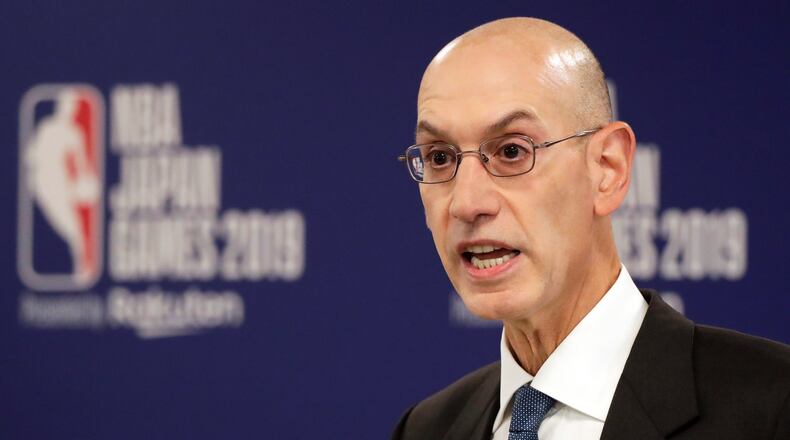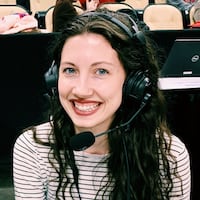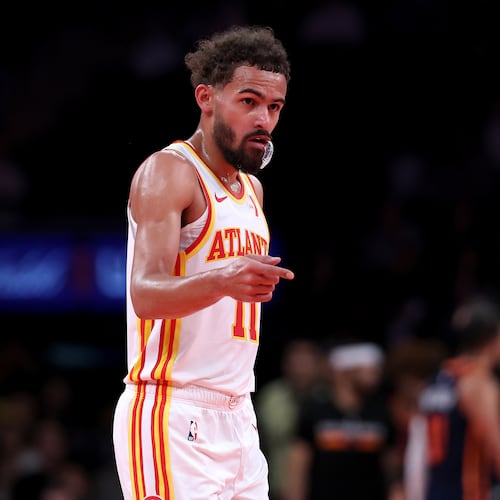In agreeing to host this year’s tamped-down NBA All-Star game amid the COVID-19 pandemic, principal owner Tony Ressler and the Hawks had one condition.
“They said, ‘Frankly, as long as this doesn’t count as our turn to have a full-fledged All-Star, we’d be happy to partner with the league,’” NBA commissioner Adam Silver remembered.
Silver quickly agreed, as the All-Star game March 7 at State Farm Arena certainly won’t look like your typical three-day weekend festivities, which are packed with community and fan events that attract tourists, publicity and ample business to the host city (last year in Chicago, former President Barack Obama helped All-Star players, including Hawks guard Trae Young, pack backpacks for low-income Chicago Public School students during the NBA Cares All-Star Day of Service). The game, skills contests and dunk contest have been compressed into a one-night affair.
In this case, there are zero plans outside the official All-Star events that will be held that Sunday night, which will not be a ticketed event open to the public and the league is actively discouraging any sort of in-person congregating (the NBA still estimates it will have a significant economic impact on the city — more on that later). Roughly 1,300 people will be in attendance, consisting of students and staff from HBCUs, which the league will feature throughout the night, local healthcare heroes and family and close friends of All-Star players.
Playing a physical All-Star game amid a pandemic has generated controversy, with the context that 30 NBA games, as of mid-February, have been postponed this season because of players testing positive for COVID-19 or contact tracing.
But, the league and the Players Association came to an agreement, and the location of State Farm Arena made it the go-to host candidate. Turner Broadcasting is close and its employees wouldn’t have to travel, the Hawks renovated the arena not long ago and Atlanta has several HBCUs in the area that the league plans to highlight, with Clark Atlanta University Philharmonic Society Choir performing an original rendition of “Lift Every Voice and Sing” and step teams from Spelman and Morehouse performing that night.
The Hawks will be “aggressive bidders” to host the All-Star game again in the coming years, eager to do it big and do it right after having such limitations on them this time. Although the next handful have been decided, per Silver, hosting this year will only help their cause in the future.
“There’s a process, of course, for awarding All-Stars, and we’ve already awarded the next few years, assuming things return to normal and we’re back to doing the traditional All-Star weekend, but there’s no doubt that there’s a bonus in their column for holding All-Star this year,” Silver said.
“And I commit, in no way could it possibly hurt them, it could only help them, and I think we all recognize that these are all such highly unusual circumstances and to be holding an All-Star during a pandemic.”
But first, more on the decision to hold an All-Star game this year in the first place.
Local and global impact
The All-Star game is the NBA’s No. 1 fan engagement event of the entire season. Based on past ratings and precedent, the game will be seen by approximately 130 million people globally, and if you extend that to people who consume different forms of media about the game, that extends to around 1.8 billion, per Silver.
Televised in 210 countries, even though this won’t bring many people to Atlanta in-person, the spotlight on the city will still have significant reach.
There’s an obvious economic component at play, as well, in a year where the league’s revenue has taken a drastic hit.
“While there’s a health emergency in this country, there’s also an economic crisis, so I think that’s sort of, for us, the ongoing tension,” Silver said. “We’re not hiding from the fact that we’re also tasked with the difficult job of keeping our league operating during a pandemic. And part of continuing to operate is to hold games and to hold marquee events like All-Star.”
Silver said the league’s revenue will be down somewhere between 30 and 40 percent this year, so, the goal is to keep typical operations going, to whatever extent is possible, with added safety precautions. That doesn’t mean the decision was easy or that there’s no risk. Beyond the NBA, the financial devastation from the pandemic has hit numerous industries and people hard.
“It’s going to be that ongoing balance in the country, as we try to find our way out of the pandemic now,” Silver said. “Again, I just keep going back to sort of the economic crisis that we’re in, and that’s in many ways as real as the health emergency. … It so happens now, 15 of our 30 teams now have fans. So half of our jurisdictions have decided it’s not a good idea, and half of them have decided it is a good idea under limited circumstances. It’s why I’ve said, none of these decisions are risk-free. I wish they were. It’s why I accept the criticism; there’s no absolute right decisions here.”
Regarding Atlanta, specifically, Temple University estimated that the league will have $9.3 million of direct spending, defined as spending that can be attributed to All-Star events, direct investments by the NBA or league partners into the community. Indirect spending, or inter-industry transactions, the spending occurring after the initial money from the All-Star event hits the city’s economy, will amount to about $3 million.
Induced spending, household-level spending and re-spending of money in the community, will amount to roughly $5.4 million. The All-Star game and events will generate more than 2,500 jobs (albeit temporary), in the form of arena game-day labor, transportation, hotels for players and guests, BioReference Laboratories for COVID-19 testing, local printers and decor companies, local unions and production companies and local minority- and women-owned business including decor, restaurants, catering, gifts and additional local labor.
Health and safety
Atlanta mayor Keisha Lance Bottoms has asked fans not to use the All-Star game as a reason to travel to the city and party, and the Hawks are discouraging people from gathering, as well, trying to market the game as a made-for-TV event.
But, events scheduled for that weekend have already started popping up around the city.
Silver joined with the mayor in discouraging large parties related to the All-Star game, but still thinks the positives of the game being played in the city outweighs the negative. He added that the league will continue to advertise the game as a limited event not open to the public, and supports the mayor in trying to limit large gatherings.
Bottoms released a statement “strongly (encouraging) promoters, clubs, bars, etc. not to host events in the city related to this game.” Ultimately, though, Georgia has more lax coronavirus restrictions, with a law that shields businesses from legal liability unless they show “gross negligence, willful and wanton misconduct, reckless infliction of harm, or intentional infliction of harm.”
“Part of my job and my disposition is to worry about everything,” Silver said. “It’s not lost on me, and at the same time, when we balance that against the job creation and the economic impact, the attention that will be paid on Atlanta and Georgia, at least for these All-Star festivities, we still think it’s net very positive, and in terms of those unauthorized parties, I know the mayor has means to address those and whatever we can do to continue to amplify the message that this strictly an arena event, we will do so.”
On the player side, the league is creating a “mini-bubble” of sorts. Players will arrive Saturday night via private plane, they will leave Sunday night after the game. They will remain in hotels where everything will be provided for them, then will head to the arena for the game Sunday.
The league has done something like this before, on a much larger scale, when it chose to restart the 2019 season and successfully held the playoffs in a bubble environment in Orlando. Silver’s bigger concern is what fans and people will do gathering to watch the game or party around the city.
“Our players will be in controlled situations in the same way they were in Orlando, so that we feel we know how to do,” Silver said. “I feel like this will be very safe for those in the NBA community. … Yes, it does worry me, if people chose to use this as an excuse to violate protocols, but I think therefore we’ve got to work closely with city and with the state that has the power to crack down on violations, that there’s a clear message sent that it won’t be tolerated.”
Only a handful of players, of course, are All-Stars, with the vast majority of the league going on a mini-break for a few days before the second half of the season beginning March 10. This season is unique, with only 72 games, a compressed schedule and a completely different calendar than usual, because of last season’s hiatus. For mental and physical health reasons, the Players Association understandably wanted a break at mid-season.
The controlled environment of the mini-bubble in Atlanta may be less risky than players who will be on their own for the break, Silver thinks.
“Everything these days is a function of relative risk, not absolute risk, so once we determined with our Players Association that there was going to be a mid-season break, and that was something that players felt very strongly about, then the question is what can we do to reduce their risk to the extent we can, when players are operating outside our team protocols during that break,” Silver said.
“The fact is, roughly 5% of our players will be participating in All-Star, and the other 95% will be on a mini-break. On a relative basis, I’m more concerned about what players will potential do on that mini-break than they will in the mini-bubble we are creating in Atlanta. We have experience operating in a bubble.”
Partnering with the Hawks, HBCUs
Because the All-Star game is so reduced this year and isn’t open to fans, Silver likened State Farm Arena to the game’s TV studio.
But, there might not have been anyone in the stands, even the small amount that will be present, had the Hawks not already had the infrastructure in place to do so. Since late January, the Hawks have permitted 8% fan capacity at games, which amounts to about 1,300 people, with mandatory masks, contactless entry and security screenings and rapid-response COVID-19 testing for those sitting within 30 feet of the court.
“That was hugely important to us and in fact we’re going to in essence try to replicate their operations,” Silver said. “We’re leaning on them heavily. … Roughly 1,300 people or so will be in attendance, and that’s something that I’m not sure we would have been able to do that if the Hawks hadn’t already come up with a mode of operations that allows fans to come in, guests to come in in a safe way, practicing all the appropriate safety protocols.”
Stemming from conversations with the Players Association, the league plans to commit more than $2.5 million in funds and resources for HBCUs and “support and awareness around equity and access to COVID-19 care, relief and vaccines.”
The league will create public service announcements and will highlight HBCUs through entertainment and programming throughout the show. It also will feature HBCU graduates and campuses.
“I think we felt, again trying to find the appropriate balance, that if we were going to play an All-Star game, we needed to find some greater meaning to it, as well,” Silver said. “And I think Atlanta in particular, because of the concentration of HBCUs there, that prior involvement of the league with HBCUs, and given the disparate impact that COVID has had both economically and health-wise on the Black community in the United States, it seems like this created an opportunity.”
About the Author
Keep Reading
The Latest
Featured


